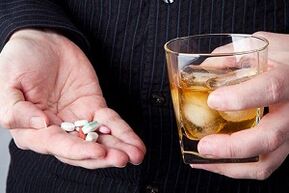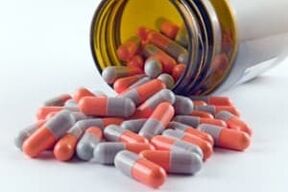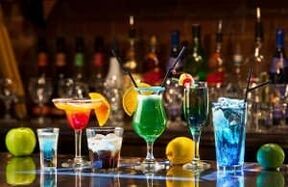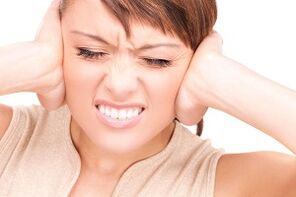Everyone knows that in no case alcohol and antibiotics should be combined, but now the treatment is over and the last pill has been taken, and it is not clear how long it is possible toto drink hard alcohol after taking antibiotics? Should I wait a few days or can I have a few drinks that evening? To answer this question, you need to understand in more detail how antibacterial drugs and alcoholic beverages work on the body, and how long after treatment should pass so that drinking does not harm health.
How many days after antibiotic treatment can you drink alcohol?

Medicines in this group are prescribed for the treatment of inflammatory diseases that the body cannot cope with on its own. Antibiotics attack pathogens, destroying their cell structure, so that the disease recedes and the patient feels better.
However, there is another aspect to taking antibacterial agents. Since their elimination from the body falls entirely on the liver, it must take a heavy blow. Experts also showed that in people who drank alcohol during antibiotic therapy, the effectiveness of treatment was significantly lower than in patients who completely refused alcohol.
It all depends on the drug used for the treatment. It is best to check this issue with your doctor. He will tell you in detail after how long you will be able to resume your usual lifestyle and take alcoholic drinks. If it is not possible to contact a doctor, then you can carefully read the instructions for the drug.
It must be marked there:
- Duration of treatment;
- This medication is compatible with ethanol;
- The period during which you should not drink alcohol even after the end of treatment.
The ban typically lasts three to seven days. It all depends on the type of drug and how long it is removed from the body.
If the annotation does not contain information about the compatibility of a drug with alcohol, this does not mean that you can start drinking immediately after the end of treatment.

In any case, it is recommended to wait at least a day to allow the residual components of the drug to leave the body.
It is important to remember that although there is no mention of interaction with ethyl alcohol in the instructions for the medication, you still should not drink alcohol immediately after the antibiotics. This can harm the body which is still immature after the disease and cause unwanted side effects.
Which antibiotics should never be combined with alcoholic beverages?
Despite all the prohibitions of doctors, some patients on treatment with antibacterial agents still manage to drink strong drinks. At the same time, they do not even think about the possible consequences and refer to the fact that all doctors' bans are nothing more than an unnecessary precaution. In fact, if the simultaneous use of alcohol and medication did not affect the patient's well-being in any way, it does not mean that everything went without leaving a trace for the body.
The components of ethyl alcohol and the drug may not directly interact, however, ethanol can significantly reduce the therapeutic properties of the drug and the effectiveness of treatment. The disease does not recede anywhere and additional treatment will be required, which will create a high load on the liver and other organs of the excretory system.
There is also a group of antibacterial drugs against which it is strictly forbidden to drink alcoholic beverages. Information on incompatibility with alcohol is indicated in the annotation of these drugs. In addition, the patient should be notified by the attending physician responsible for prescribing the drug.
Drugs that are completely incompatible with ethyl alcohol include:

- Tetracyclines.They are widely used in medical practice for the treatment of various infectious diseases.
- Levomycetins.Drugs in this group on their own can cause serious side effects, and their simultaneous use with strong drinks can worsen the toxic effect of the drug.
- Lincosamides.Drinking alcohol while taking these antibiotics negatively affects the central nervous system and the liver.
- Aminoglycosides.Some of the strongest antibacterial agents that don't work well with other drugs. It is categorically contraindicated to drink strong drinks during treatment with these drugs.
- Cephalosporins.A disulfiram-like reaction can occur from simultaneous use of these drugs with strong drinks. The person will show symptoms of severe poisoning, which will cause their health to deteriorate significantly. Antibiotics
- anti-tuberculosis drugs.
- Macrolides.The interaction of these substances with ethanol has a strong toxic effect on the brain and liver.
- Antibioticsused in the treatment of leprosy.
There are certain groups of antibacterial drugs whose markings do not indicate how they interact with ethyl alcohol.
These medicines include:
- Antifungal agents;
- Penicillin and others.
The fact that the instructions for use do not contain information on the effects of the combination of these medicines with alcohol does not mean that their combination is allowed. It should be taken into account that each person's body is unique, and someone after a combination of alcohol and antibacterial agents will stay safe, and someone will be at great risk.

How long after treatment with antibacterial drugs can you afford to drink alcohol? It all depends on the type of antibiotics and the physical condition of the patient. If the annotation indicates that it is forbidden to drink alcohol while taking the drug, then it is better to wait until the residual components of the drug are completely eliminated from the body. It usually takes around two weeks, so it's best to wait until this period is over with strong drinks.
If the instructions for the drug do not indicate the specifics of its interaction with ethanol, it is always better not to drink alcoholic beverages for at least three days after the end of treatment.
If you have any further questions, you can contact your doctor. He will explain in detail whether it is possible to consume alcohol while taking either antibacterial drug or the other and tell you how long after the treatment is finished it is better not to drink alcoholic beverages.
Possible consequences of the combination
Drinking alcohol after antibiotics can trigger unwanted symptoms and negative side reactions in the body. The point is that there are a number of antibiotics that can block the breakdown of ethanol in the body. Because of this, acetaldehyde stops being excreted from tissues and organs and begins to accumulate there.
In this case, the body is poisoned and the person experiences painful symptoms of poisoning:

- Attacks of nausea and vomiting;
- An intolerable headache that even pain relievers cannot relieve;
- Dizziness;
- Difficulty breathing;
- Pressing chest pain;
- Redness of the skin;
- Perspiration;
- An increase or decrease in blood pressure.
This is far from a complete list of the terrible consequences of the combination of alcohol and drugs.
It is important to remember that only a few antibiotics have been shown to be incompatible with ethanol to date in clinical studies. The others are not yet fully understood or remain in doubt.
In any case, a person should be aware that excessive alcohol consumption has a negative effect on the treatment process. Ethanol interferes with the normal absorption of drugs and significantly reduces their effectiveness. Therefore, during the course of treatment you should refuse to take any type of alcohol, even the weakest.
It will help you to avoid nasty side effects and keep healthy. After all, no one can say for sure how the simultaneous consumption of alcohol and antibacterial agents will affect the health of a particular person.
























